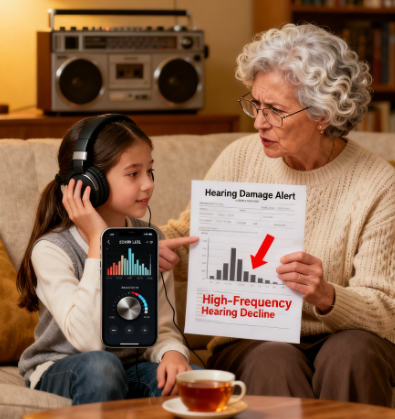
Listening to Music at This Volume for an Hour a Day Can Damage Your…
There’s nothing quite like getting lost in your favorite music. Maybe it’s the soaring strings of a classical piece, the smooth vocals of a jazz standard from your youth, or the comforting rhythm of classic rock. You put on your headphones or turn up the stereo, and for a little while, the world fades away. It’s good for the soul. But what if this daily retreat is quietly harming one of your most precious senses?
For those of us in our 50s, 60s, and beyond, protecting our hearing becomes increasingly important. Hearing loss is often viewed as an inevitable part of aging, but a significant portion is actually preventable—and it’s caused by exposure to loud noise over time. The dangerous part? The volume level that can cause damage is lower than most people realize.
The critical threshold is 85 decibels (dB). Listening to music at this volume for just one hour a day can, over time, cause permanent damage to the delicate hair cells in your inner ear, leading to irreversible hearing loss.
What Does 85 Decibels Sound Like?
It’s easy to think of hearing damage as something that only happens at rock concerts or while using power tools. But 85 dB is not an ear-splitting level. It’s roughly equivalent to:
- The noise of heavy city traffic heard from inside a car.
- A busy restaurant during the dinner rush.
- A gas-powered lawn mower.
If you listen to music through headphones at a volume that just barely blocks out the background conversation in a room, you are likely at or above 85 dB. Many personal listening devices can reach volumes well over 100 dB at their maximum setting—levels that can cause damage in a matter of minutes.
The Silent Culprit: How the Damage Happens
Deep inside your ear, in the cochlea, are thousands of tiny, delicate hair cells. These cells are responsible for converting sound vibrations into electrical signals that your brain interprets as sound. They are irreplaceable; once they are damaged or die, they do not grow back.
Loud noise is like a violent storm for these fragile cells. The intense sound waves create excessive vibrations that literally shear the hairs off the cells. Initially, the damage might be temporary—you might experience muffled hearing or a ringing in your ears (tinnitus) that goes away after a few hours. But with repeated exposure, the damage becomes permanent. The cells die, and your ability to hear certain frequencies—often starting with high-pitched sounds—disappears forever.
The Ripple Effects of Hearing Loss
The consequences extend far beyond simply turning up the television volume. Untreated hearing loss is strongly linked to:
- Social Isolation: When conversations become difficult to follow, people often withdraw from social gatherings, leading to loneliness and depression.
- Cognitive Decline: The brain has to work harder to process sound, which can come at the expense of other cognitive functions like memory and thinking. Several major studies have shown a strong correlation between hearing loss and an increased risk of dementia.
- Safety Risks: An inability to hear alarms, sirens, or approaching vehicles can pose serious safety hazards.
How to Protect Your Hearing Without Giving Up Music
The goal isn’t to stop enjoying music, but to enjoy it safely. Here are some simple rules of thumb:
- The 60/60 Rule: A great guideline is to listen to your personal listening device at no more than 60% of its maximum volume for no longer than 60 minutes at a time. After an hour, give your ears a break.
- Use Over-the-Ear Headphones: In-ear earphones (earbuds) sit closer to the eardrum and can require less volume to achieve the same perceived loudness. Over-the-ear, noise-canceling headphones are often a better choice because they block out background noise, allowing you to listen at a lower, safer volume.
- Test the Volume: Have a simple conversation while listening to your music. If you cannot understand someone speaking to you at an arm’s length away, your volume is too high.
- Let Your Ears Rest: After being in a noisy environment (like a restaurant or a car ride), give your ears several hours of quiet to recover.
Your hearing is a gift that connects you to the people and the world you love. By being mindful of the volume for just that one hour a day you spend with your music, you are taking a powerful step to preserve that connection for years to come. You can still feel the joy and comfort of your favorite songs—you’ll just be ensuring you can still hear the laughter of your grandchildren, too.